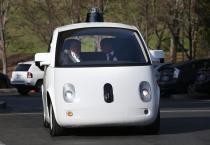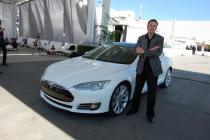It's Tesla vs. Google in the battle for the car of the future — and only 1 can win (TSLA, AAPL, GOOG)

Over the past year, the car of the future has gone from being a topic of speculative discussion to being an impending reality pondered by the titans of both the traditional auto industry and Silicon Valley.
Audi sent a driverless car from Los Angeles to Las Vegas in January. Tesla is planning to sell 55,000 electric vehicles in 2015. And, just in case you missed it, Apple is rumored to be working on a car.
But the most dramatic and far-reaching vision for the future of getting around comes from Google. The tech colossus is now a car maker, creating a fleet of prototype driverless cars that look a lot more like transportation pods controlled by artificial intelligence than a good old-fashioned set of wheels.
Google represents one idea about the future of mobility. Tesla — and much of the rest of the auto industry — has committed to the another.
Idea Number 1: The internal combustion engine will gradually fade away, and cars will eventually drive themselves.
This is the incrementalist view. Tesla is right at the center of it: a disruptive startup automaker, selling only electric cars, with a suite of "autopilot" self-driving features coming online and ambitions to fully automate the driving experience sooner rather than later.
However, the process will take place in a car — a car that looks a lot like cars have always looked. No radical departure from the past here. And on top of that, Tesla's are expensive. And designed to be owned. By individuals. With other types of property. Ideally, if you own a Tesla, you also own a garage.
CEO Elon Musk's vision is to replace the entire global fleet of fossil-fuel-burning vehicles with EVs. He wants to save the planet — but he wants to do it with outwardly recognizable technology and vehicle ownership patterns. At least for now.

Idea Number 2: The car as we know it will go away, replaced by an autonomous node in an on-demand, ownership-free transportation matrix, enabled by inexpensive personal technology that's ubiquitous — who needs a garage when you have a smartphone?
This is the future that the Google Car points to. It isn't that much of a leap, even though the idea sounds pretty out-there. The special sauce, of course, is Uber. Smartphone users can already summon a ride on demand. Take the Google Car and plug it into that platform and you have a complete transformation of mobility. If you can order up a ride — a driverless ride, running on electricity — anywhere, anytime, in all but the most remote places, you don't need a personal car.
You also don't need a driver's license, or a loan, or car insurance, or any of the numerous economically important things that go along with owning your own form of transportation.

Now, you might say that the Google Car future is far too exotic to come true. The Tesla future is the betting man's choice.
But if you'd asked me two years ago whether autonomous driving features would converge so rapidly in late 2014 and early 2015, I would have been skeptical. The speed at which we've gone from imagining self-driving cars to expecting them has stunned me.

 Yahoo Autos
Yahoo Autos 
